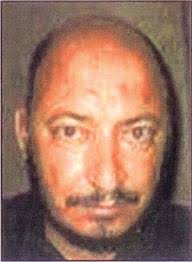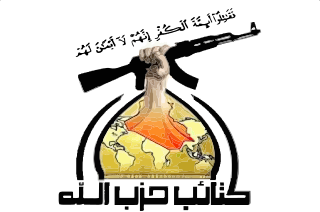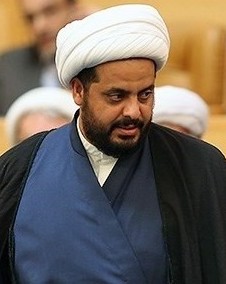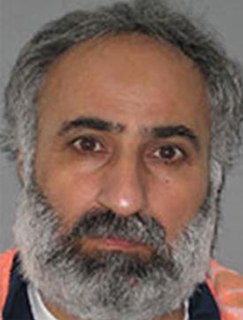Related Research Articles

The occupation of Iraq is characterized by a large United States military deployment on Iraqi territory, beginning with the U.S.-led invasion of the country in March 2003 which overthrew the Ba'ath Party government of Saddam Hussein and ending with the departure of US troops from the country in 2011. Troops for the invasion came primarily from the United States, the United Kingdom and Poland, but 29 other nations also provided some troops, and there were varying levels of assistance from Japan and other countries.

Jama'at al-Tawhid wal-Jihad, which may be abbreviated as JTJ or Jama'at, was a militant Jihadist group. It was founded in Jordan in 1999 and was led by Jordanian national Abu Musab al-Zarqawi for the entirety of its existence. During the Iraqi insurgency (2003–11), the group became a decentralized network with foreign fighters and a considerable Iraqi membership.

An insurgency began in Iraq after the 2003 US-led invasion, and lasted throughout the ensuing Iraq War which lasted from 2003 until 2011. The first phase of the insurgency began shortly after the 2003 invasion and prior to the establishment of the new Iraqi government. From around 2004 to May 2007, the insurgency primarily targeted the Multi-National Force – Iraq. Latterly Iraqi security forces were also targeted, as they were seen by Iraqi insurgents as collaborators with the coalition.

The 2003–2006 phase of the Iraqi insurgency began following the completion of the invasion of Iraq and the toppling of Saddam Hussein's rule in May 2003. The armed insurgent opposition to the U.S.-led multinational force in Iraq and the post-2003 Iraqi government lasted until early 2006, when it escalated into a civil war, the most violent phase of the Iraq War.

Al-Qa'im is an Iraqi border town located nearly 400 km northwest of Baghdad near the Syrian border and situated along the Euphrates River, and located in the Al Anbar Governorate. It has a population of about 74,100 and it's the center of the Al-Qa'im District.

Abu Ayyub al-Masri, also known as Abu Hamza al-Muhajir, born Abdel Moneim Ezz El-Din Ali Al-Badawi, was the leader of Al-Qaeda in Iraq during the Iraqi insurgency, following the death of Abu Musab al-Zarqawi in June 2006. He was war minister of the Islamic State of Iraq from 2006–2010 and prime minister of the Islamic State of Iraq from 2009–2010. He was killed during a raid on his safehouse on 18 April 2010.

Hamid Dawud Mohamed Khalil al-Zawi, known as Abu Hamza al-Baghdadi and Abu Omar al-Qurashi al-Baghdadi, was the leader of the militant groups Mujahideen Shura Council, and its successor, the Islamic State of Iraq, which fought against US forces and their Iraqi allies in the Iraq War.
Hamid Juma Faris Jouri al-Saeedi was a member of Al-Qaeda in Iraq accused by Iraq's government of being "the number two al-Qaeda leader [in Iraq] after Abu Ayyub al-Masri." He was captured during a joint raid by Iraqi and United States forces on June 19, 2006 either north or southwest of Baquba, Iraq.
Ismail Hafidh al-Lami — known as Abu Deraa was an Iraqi Shia militant whose men have been accused of retaliatory terrorizing and killing Sunnis. He was reportedly killed in Baghdad after a clash with unknown armed groups on 29 June 2021.

Abu Musab al-Zarqawi, born Ahmad Fadeel al-Nazal al-Khalayleh, was a Jordanian jihadist who ran a terrorist training camp in Afghanistan. He became known after going to Iraq and being responsible for a series of bombings, beheadings, and attacks during the Iraq War, reportedly "turning an insurgency against US troops" in Iraq "into a Shia–Sunni civil war". He was sometimes known by his supporters as the "Sheikh of the slaughterers".

Operation Marne Torch refers to two operations launched by U.S.-led Coalition forces in 2007 against al-Qaeda in Iraq in the Arab Jabour area of Babil province. This campaign is named after Operation Torch, the joint US/British invasion of French North Africa in 1942, presumably because of the two operations' similar thrust into the enemies' southern underbellies.
Special Groups (SGs) is a designation given by the United States military to the cell-based Shi'a paramilitary organizations operating within Iraq, backed by Iran. According to the United States these groups are funded, trained, and armed by the Iranian Quds Force, part of the Islamic Revolutionary Guard Corps (IRGC). According to the United States Department of Defense, 603 American troops in total were confirmed to have been killed by IRGC-backed Shia militias during the Iraq War.

Kata'ib Hezbollah —or the Hezbollah Brigades—is a radical Iraqi Shiite paramilitary group which is part of the Popular Mobilization Forces backed by Iran. During the Iraq War (2003–11), the group fought against Coalition forces. It has been active in the War in Iraq (2013–2017) and the Syrian civil war (2011–present). The group was commanded by Abu Mahdi al-Muhandis until he was killed by a US airstrike in Baghdad on 3 January 2020. Thereafter, he was replaced by Abdul Aziz al-Muhammadawi, as the new leader of the Popular Mobilization Forces (PMF).

Qais Hadi Sayed Hasan al-Khazali is best known as the founder and leader of the Iran-backed Special Groups in Iraq from June 2006 until his capture by British forces in March 2007. As head of the Special Groups, Khazali directed arms shipment, formation of squads to participate in fighting, and insurgent operations, most notably the 20 January 2007 attack on American forces in Karbala. A former follower of Muqtada al-Sadr, he was expelled from the Mahdi Army in 2004 for giving "unauthorized orders" and founded his own group: Asa'ib Ahl al-Haq (AAH) also known as the "Khazali network" that was later designated as a terrorist group by the U.S. Department of State. During his incarceration, Akram al-Kaabi became acting commander of the organization until his release.

Asa'ib Ahl al-Haq, also known as the Khazali Network, is a radical Iraqi Shi'a political party and paramilitary group active in the Iraqi insurgency and Syrian Civil War. During the Iraq War it was known as Iraq's largest "Special Group", and is now part of the Popular Mobilization Forces (PMF), a group of Shi’ite militias that are close to Iran.
The Sheibani Network is an Iraqi smuggling network and Shi'a Insurgent group led by Abu Mustafa al-Sheibani, an ex-commander of the Supreme Council for Islamic Revolution in Iraq's Badr Brigades. The group is said to be used by Iran's Revolutionary Guards' Quds Force to supply Iraqi Special Groups. The group is alleged to be responsible for numerous attacks on Iraqi and Coalition forces. The network is said to consist of 280 members, divided in 17 units. US commanders have estimates that weapons smuggled and used by the group have been responsible for the death of 170 and injury of 600 American soldiers by February 2007. Abu Mustafa al-Sheibani himself is said to have fled to Tehran, Iran to evade capture, where he currently resides.

The Islamic State of Iraq, commonly referred to as al-Qaeda in Iraq, was a militant Salafist jihadist group that aimed to establish an Islamic state in Sunni, Arab-majority areas of Iraq during the Iraq War and later in Syria during the Syrian Civil War.

Abdulrahman Mustafa al-Qaduli, better known by his noms de guerre Abu Ala al-Afri and Abu Ali al-Anbari, was the governor for territories held by the Islamic State of Iraq and the Levant (ISIL) in Syria. Considered the ISIL second-in-command, he was viewed as a potential successor of ISIL leader Abu Bakr al-Baghdadi.

Jamal Ja'far Muhammad Ali Al Ibrahim, known by the kunya Abu Mahdi al-Muhandis, also spelled Mohandes, was an Iraqi commander of the Popular Mobilisation Forces (PMF). At the time of his death, he was deputy chief of the PMF.
On 29 December 2019, the United States conducted airstrikes against Kata'ib Hezbollah's weapons depots and command centers in Iraq and Syria, reportedly killing at least 25 militiamen and wounding 55 more. The U.S. Department of Defense said the operation was in retaliation for repeated attacks on Iraqi military bases hosting Operation Inherent Resolve (OIR) coalition forces, particularly the 27 December 2019 attack on a Kirkuk airbase that left an American civilian contractor dead. Kata'ib Hezbollah, an extremist Shi'ite militia funded by Iran, denied any responsibility for the attacks.
References
- ↑ "Iran's Foreign Legion: The Role of Iraqi Shiite Militias in Syria" . Retrieved 9 March 2015.
- 1 2 United States Department of the Treasury Treasury Designates Individuals, Entity Fueling Iraqi Insurgency Archived 2010-05-28 at the Wayback Machine
- ↑ GlobalSecurity.org Abu Mustafa al-Sheibani
- 1 2 Iraq: Return of Sheibani's killer squads, Sept. 30, 2010
- ↑ "Iran's Hard Power Influence in Iraq". Archived from the original on 2014-11-16. Retrieved 2010-05-14.
- ↑ BBC Iraq exit strategy still elusive, 21 September 2005
- ↑ Press Briefing, July 2 [usurped!]